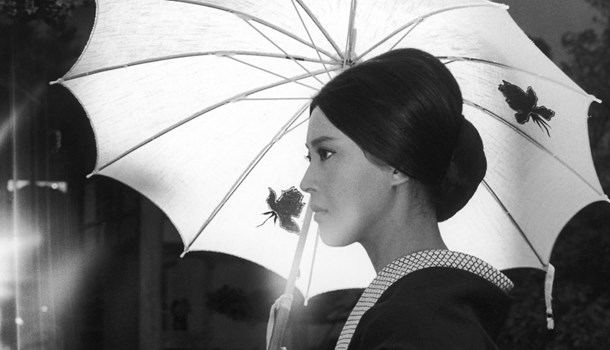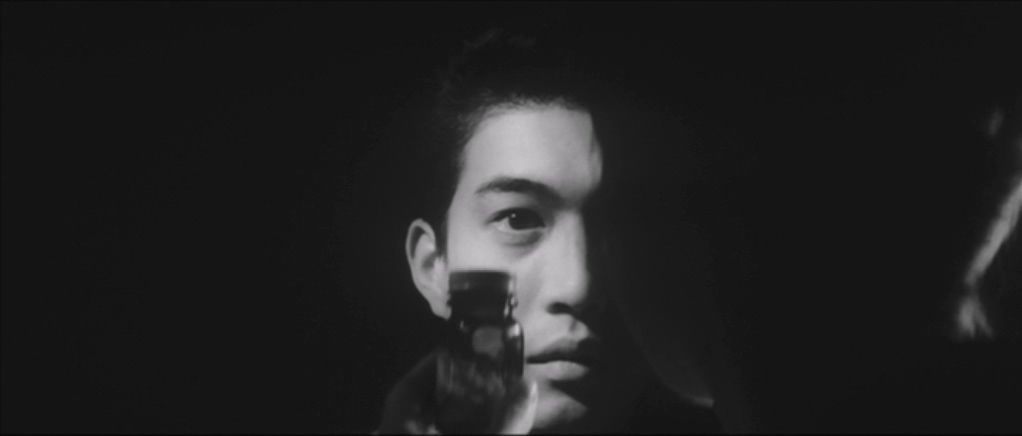
Written by Richard Durrance on 11 Apr 2024
Distributor Radiance • Certificate 15 • Price £17.99
The release of A Story Written with Water (1965)by Radiance made me realise I still had the boxset of films by the same director, Kiju (sometime Yoshishige) Yoshida, sitting around unwatched. I meant to get to it before A Story Written with Water but good intentions didn't equal action. So this was my toe in the water of the new-wave director. Toe dipping can be dangerous but also exhilarating, my reaction to the recent Tai Kato films proved that. But I also knew this was going to be a different beast.
Young office worker Shizuo (Yasunori Irikawa) is engaged to Yumiko (Ruriko Asaoka) but seems to feel no elation at the prospect, instead his emotions towards his fiancé are overshadowed by his closeness to his age-defying mother, Shizuka (Mariko Okada), who may be having a long-running affair with Yumiko’s father, Denzo (Isao Yamagata).
This is the kind of film I dread trying to review because I am aware of so much. Firstly this is a film of mood and a film in which you likely might need to be in the right sort of inclination to watch. Be in the wrong one and you may throw your toys out of the pram; but in the right mood it is one that has a haunting power that is so hard to define that it seems to make trying to write about it seem pointless. It's hard to describe in a way that doesn't lead to woolly language. You can describe aspects of the plot and character, both of which are important, but also arguably entirely beside the point.
Certainly, you could potentially see A Story Written with Water in part as an oedipal drama but one that entirely defies categorisation. There are standard dramatic moments, but never for a minute is the content treated dramatically, and certainly never melodramatically, instead the film unfolds in a visually seductive array of moments, carrying with them a kind of unreality that helps the viewer get to the emotional truth the film is searching for, one where human emotions are shown to be conflicting, subtle, confused and confusing, and nothing is ever simple or straightforward. Here is a film that could be condensed into a moral tale but never is. There is something numinous about the film and thoroughly unknowable. You can see why few such films might be made because to pitch such a film would be impossible as the story is secondary to... to what? It’s hard to define, the performances, Okada especially, can be marvellous, but perhaps it is the filmmaking that is the star but then it never overshadows a thing. That said, shadows, visuals, yes, the film is magnificently stark, the cinematography almost film noir in its distinctions - no Jospeh Walker style glistening photography - yet it is quietly beautiful. Many and most shots could be framed and placed on the wall. Yet it never feels like it is trying to be arty, style integrates and is part of the film, indivisible from all else we witness.
Yet for all its beauty it is not this alone. Where it quietly astounds, it slowly unpicks and shows what other films of the period would not, it is frank about sex without ever trying to be so, not in the sense of prurient detail but in how we might witness a quiet conversation about virginity and the difficulty of speaking about it without any awkwardness. Rather we get insight into the unseen and the hidden. Throughout the film we seem to come across the hidden every day, relationships in all their subtle detail and intricacies, the result being quietly revealing to the viewer, where we are as caught in the midst of what we should not witness as our character might be, especially in flashbacks to the young Shizuo.
After watching the film, I had that strange need to put some first words down, to try and capture some aspects of what it felt like watching the film, because it's the feelings evoked by the film that seem to take centre stage as opposed to the usual elements we might critique. Talk about composition all you like, but here that seems to me to be superfluous in many ways, yes technically, even artistically it matters but somehow the physical experience of watching the film is what really strikes you like a soft blade, insinuating itself without you knowing it.
Parts of the film reminded me a little of Radiance’s recent The Sting of Death in its artificiality, a belief that you can show the reality of feeling through moments that are in many ways hopelessly contrived, and that’s the thing, again, returning to the reviewers nightmare, because much of the film could be an emotionally contrived joke of nonsensicality yet the reality feels so much richer and deeper. But there is no moral story here, no desire to tell us what to do, or how to live, if anything the film seems to suggest that there is richness in experience, love, and that nothing is ever quite as it seems. As we witness those moments that are hidden none of this is shouted at us, it’s clear, but it tells us it is always here. The director seems to be peeling back layers of truth.
There are fascinating aspects too, which in films of the time were often ignored. The concept of love as you get older does not change as we do not necessarily age internally. How we act and feel are often complex and not easily reconcilable to simplistic concepts of right and wrong, which the film is never for a moment interested in.
How Shizuka is treated, always first and foremost as a human being, is so at odds with morality of much of the years of cinema gone by – often since the early 1930s – that it feels like a mature breath of fresh air. Once again, the film doesn’t ever preach, it simply unfolds, allowing us a view a series of glimpses of one person that touches others, whether her husband as he is dying of consumption during the war, or with her son at any age, she is a living, breathing person in a rare way and the film neither tells us what she does is good or bad, her motives are honest, and true to herself and what more can we ask of a character?
I can imagine this might not be a film for everyone, and as mentioned in the wrong mood it might lead one to switch off, but for me, watching it was a beguiling, dreamlike sensation, in which I never quite knew where I might be lead. Though right from the start I knew I was unsettled, a conversation in a car I misread suggested something, ironically, not far from the truth of aspects of the story, and this is a film that should in parts unsettle, but also seduce. It’s a rare thing, and worth treasuring all the more for it.
The music has aspects of what I remember listening to in Toru Takemitsu some years ago, slightly dissonant, somehow fragmentary but never noise. The music matches the mood of the film and seems very precise in what would have been modernity, and mood is part of seduction so the importance of the soundtrack throughout the film matters, as do the visuals I’ve spoken of, the stark black and white that reminds you how poorly colour is so often used when two shades of light and dark can be so enthralling and enrapturing.
This review rather wrote itself, which wasn't my intention when starting it. This is rare and rarer still is how hard to start such a review, despite being hard to define, words seemed to flow anyway. This is not about me, as it may seem, but about the impact of the film. I loved Radiance’s I, the Executioner more perhaps than even The Sting of Death, but there is something so remarkable about A Story Written With Water in it's ability to make the review simple because of the impossibility of providing a description with precision.
If there is a moral to the film, it is not in the film, itself but in it's own potential fleeting existence. This may be a limited Blu Ray pressing so if you're interested, grab one now. I would certainly suggest you do. Save it for an evening when you're in the mood for something that will evoke feelings rather than simple narrative pleasure, because few films will have this impact, just one reason why we should be grateful for this release.


Long-time anime dilettante and general lover of cinema. Obsessive re-watcher of 'stuff'. Has issues with dubs. Will go off on tangents about other things that no one else cares about but is sadly passionate about. (Also, parentheses come as standard.) Looks curiously like Jo Shishido, hamster cheeks and all.
posted by Richard Durrance on 12 Feb 2026
posted by Richard Durrance on 10 Feb 2026
posted by Richard Durrance on 07 Feb 2026
posted by Richard Durrance on 03 Feb 2026
posted by Richard Durrance on 27 Jan 2026
posted by Richard Durrance on 19 Jan 2026
posted by Richard Durrance on 08 Jan 2026
posted by Richard Durrance on 17 Dec 2025